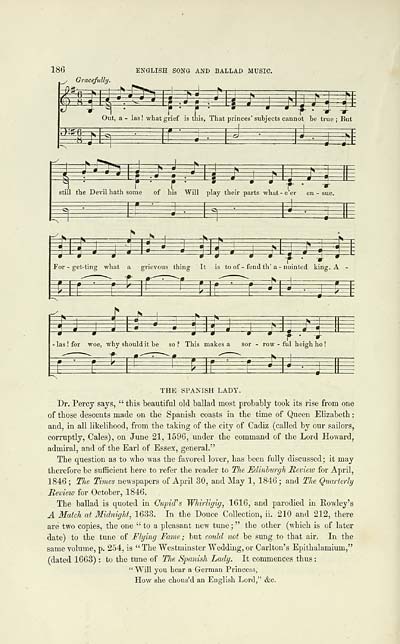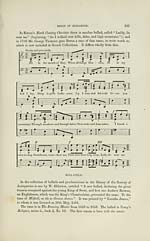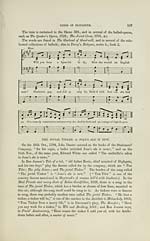Glen Collection of printed music > Printed text > Popular music of the olden time > Volume 1
(220) Page 186 - Spanish lady
Download files
Complete book:
Individual page:
Thumbnail gallery: Grid view | List view

186
ENGLISH SONG AND BALLAD MUSIC.
Gracefully.
i
*
fii
^^■^A t^^^ --
^
S
Out, a- las! what grief is this, That princes' subjects cannot be true; But
FRgfF
n
±s-
;/7-;| J
^t
^
still the Devil hath some of his Will play their parts what- e'er en - sue.
^
^
u
^
3^E
^ *
f- • -r
For - get-ting what a grievous thing It is to of - fend th' a- nointed king. A
Efe
^^^
i
^
$
sor
las ! for woe, why should it be
so ? This makes a
•^ f '
^
row - ful heigh ho !
THE SPANISH LADY.
Dr. Percy says, " this beautiful old ballad most probably took its rise from one
of those descents made on the Spanish coasts in the time of Queen Elizabeth :
and, in all likelihood, from the taking of the city of Cadiz (called by our sailors,
corruptly. Gales), on June 21, 1596, mider the command of the Lord Howard,
admiral, and of the Earl of Essex, general."
The question as to who was the favored lover, has been fully discussed; it may
therefore be sufficient here to refer the reader to Tlie Edinhnrgh Revieiv for April,
1846 ; Tlie Times newspapers of April 30, and May 1, 1846 ; and The Quarterly
Review for October, 1846.
The ballad is quoted in Cupid's Wliirligig, 1616, and parodied in Rowley's
A Match at Midnight, 1633. In the Douce Collection, ii. 210 and 212, there
are two copies, the one " to a pleasant new tune ; " the other (which is of later
date) to the tune of Flying Fame ; but could not be sung to that air. In the
same volume, p. 254, is " The Westminster Wedding, or Carlton's Epithalamium,"
(dated 1663) : to the tune of Tlie Spanish Lady. It commences thus :
"Will you hear a German Princess,
How she chous'd an English Lord," &c.
ENGLISH SONG AND BALLAD MUSIC.
Gracefully.
i
*
fii
^^■^A t^^^ --
^
S
Out, a- las! what grief is this, That princes' subjects cannot be true; But
FRgfF
n
±s-
;/7-;| J
^t
^
still the Devil hath some of his Will play their parts what- e'er en - sue.
^
^
u
^
3^E
^ *
f- • -r
For - get-ting what a grievous thing It is to of - fend th' a- nointed king. A
Efe
^^^
i
^
$
sor
las ! for woe, why should it be
so ? This makes a
•^ f '
^
row - ful heigh ho !
THE SPANISH LADY.
Dr. Percy says, " this beautiful old ballad most probably took its rise from one
of those descents made on the Spanish coasts in the time of Queen Elizabeth :
and, in all likelihood, from the taking of the city of Cadiz (called by our sailors,
corruptly. Gales), on June 21, 1596, mider the command of the Lord Howard,
admiral, and of the Earl of Essex, general."
The question as to who was the favored lover, has been fully discussed; it may
therefore be sufficient here to refer the reader to Tlie Edinhnrgh Revieiv for April,
1846 ; Tlie Times newspapers of April 30, and May 1, 1846 ; and The Quarterly
Review for October, 1846.
The ballad is quoted in Cupid's Wliirligig, 1616, and parodied in Rowley's
A Match at Midnight, 1633. In the Douce Collection, ii. 210 and 212, there
are two copies, the one " to a pleasant new tune ; " the other (which is of later
date) to the tune of Flying Fame ; but could not be sung to that air. In the
same volume, p. 254, is " The Westminster Wedding, or Carlton's Epithalamium,"
(dated 1663) : to the tune of Tlie Spanish Lady. It commences thus :
"Will you hear a German Princess,
How she chous'd an English Lord," &c.
Set display mode to: Large image | Transcription
Images and transcriptions on this page, including medium image downloads, may be used under the Creative Commons Attribution 4.0 International Licence unless otherwise stated. ![]()
| Special collections of printed music > Glen Collection of printed music > Printed text > Popular music of the olden time > Volume 1 > (220) Page 186 - Spanish lady |
|---|
| Permanent URL | https://digital.nls.uk/91370087 |
|---|
| Shelfmark | Glen.254 |
|---|---|
| Additional NLS resources: | |
| Attribution and copyright: |
|
| Description | Scottish songs and music of the 18th and early 19th centuries, including music for the Highland bagpipe. These are selected items from the collection of John Glen (1833 to 1904). Also includes a few manuscripts, some treatises, and other books on the subject. |
|---|
| Description | The Glen Collection and the Inglis Collection represent mainly 18th and 19th century Scottish music, including Scottish songs. The collections of Berlioz and Verdi collected by bibliographer Cecil Hopkinson contain contemporary and later editions of the works of the two composers Berlioz and Verdi. |
|---|

